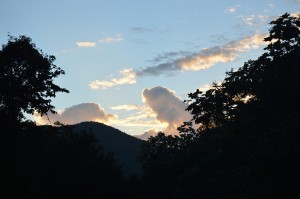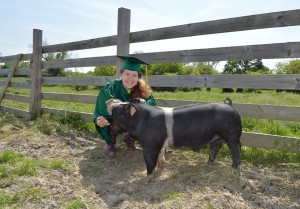For Engineering Open House I imagine our booth to be the movie booth that we discussed earlier during our time in Puerto Rico. We’ll have our tent sectioned off into three areas, each area will have two+ monitors, with videos focusing on El Yunque, the beach/ocean and agriculture. While I think the movie booth will be super cool and attract many visitors, I can see one major pitfall in our plan. That being, while we have our videos and send people through our series of movies, people will be engaging with the screens. Our videos, while providing people the chance to get a taste of Puerto Rico, eliminate us from the equation the moment we hit play. So hopefully we can come up with a way to keep all us as part of the presentation. Maybe the best way to do that would be a game, similar to ‘Puerto Rico, Illinois, los dos o ninguno?’ that could be played in the begin, but the game has a few more questions that are more educational about Puerto Rico. Then after our visitors walk through our series of movies, we could have an exit game, or give the visitors a chance to ask us any questions. That way we could be more engaged with anyone that chooses to visit us.
Author Archives: Jennifer Marten
U-Turns and Lizards
After spending two weeks in Puerto Rico, traveling to different places and partaking in various activities; there are a few things that I have noticed that reminded me about the importance of perspective. To start, simply living with twelve other people that I wasn’t the closest with reminded me how a group of people with so many similarities can still lead completely different lives. Everyone on this trip had similar interests that brought us to Puerto Rico, but we all have had different responds to the things we experienced. On the other hand, simply being in Puerto Rico has given me new perspective on global issues. Particularly, how an engineer might handle an issue they need to solve. I used to think that should they ever be faced with an international problem, they could simply travel to the area and evaluate the best way to construct a solution. But now after this trip, I’ve realized that the best way to be prepared to face global issue is to gain as international an education as possible. While traveling to the problem is necessary, I’ve found it rather eye opening to go and live in a place other than my comfort zone. This is because when living somewhere you gain a more accurate idea of what the people there find convenient and acceptable. Even though you couldn’t truly live everywhere to learn how to best handle all situations; simply the act of learning to live somewhere will give you a more open mind to deal with other places. Examples for Puerto Rico would be the commonality of U-turns, from my perspective I was always told to try to the limit the number of U-turns you make; meanwhile in Puerto Rico U-turns appear to be very common, even necessary to get the direction you want to go. Therefore, if a civil engineer would need to solve a problem, they would have to consider the differences in driving styles, while something like this might be obvious for certain places, it isn’t necessarily the case in all cases. But while you were in college you took the chance to learn in places other than you’re used to you would be more prepared to adapt your plan of action. 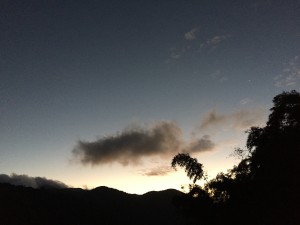
This trip has also reminded me that if one thing small thing changes in the environment, every where else can experience different issues. For example, during El nino Illinois experiences a slightly warmer and less snowy winter; but in Puerto Rico the warmer weather means less rain. While they suffered a drought last year, the warm weather this year will not help in recuperating, actually it will most likely cause harm to the quality of the following coffee harvest. While El nino is a natural occurrence, there are other factors that are quickly becoming issues, but the effect each location vastly differently. It’s important to recognize that every place has it’s own nuances and niches it needs to function properly. While we hiked around the beach in Cabo Rojo, everyone saw many bearded lizards, which actually aren’t native to Puerto Rico at all. But people have released them and Puerto Rico has provided them with the resources to survive. Seeing all these non-native lizards got me thinking about invasive species and how a balanced ecosystem can so quickly be turned upside down by one species. It’s only after all these small observations that I realized my perspective was very one sided. It was all just facts I thought I knew and thought I understood. But in reality nothing comes close to seeing the real occurrences and the issues people are facing firsthand. Many people think that if they read about a subject they’ll be able to understand it. While they might be able to on a technical level, they won’t be able to have a full, well-rounded knowledge of said subject. Overall this trip taught me more than some facts about Puerto Rico, it broaden my perspective and changed how I plan to approach certain aspects of my education (aka study abroad in the more exotic places that challenge my comfort zone).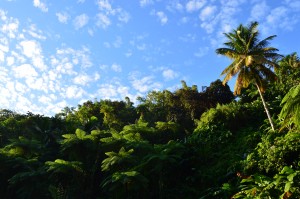
Post 1: If only I drank coffee…
This is my first trip to Puerto Rico, and it definitely has been a great experience, not what I expected, but still great nonetheless. Puerto Rico surprised me in many ways, from terrain to lifestyle. For the first and biggest surprise I experienced, was realizing how mountainous the whole island of Puerto Rico is; I expected the east end with the rain forest would be the only place to find a few mountains. But in reality the mountains sprawl across the middle of the island, this causes there to be a greater diversity in climate than I previously thought existed in Puerto Rico. With the extent of the diversity, there are many different ways to grow the same crop, which I thought the limited space of an island wouldn’t allow for. The biggest example is coffee, I never realized that the elevation would differ so much that the crop had to be grown different ways in various locations on the island. In high elevation you don’t need as much shade because of the cooler temperatures. Meanwhile. at the lower elevations farmers choose to grow foliage to provide shade for the coffee plants, creating the cooler temperatures needed for the coffee to thrive. The cover that some farms plant can be almost anything, some places choosing to plant another, taller crop, which then serves two purposes. I also found it interesting how the process of processing coffee has not really updated that much, at least on a small, quality production scale, the steps are essentially the same. At Hacienda Buena Vista they set their washed beans out to dry on giant shelves, the same way they did it back in the 1800s. At Cafe Gran Batey they had a large oven that dried their beans, but in order to cut costs due to high fuel prices, they built a greenhouse. And in that greenhouse they had long tables and set out their beans to dry, essentially the same thing that Hacienda Buena Vista did in the 1800s. Even though there is the potential for new technology to be utilized, Cafe Gran Batey chooses the process similar to the older ways.
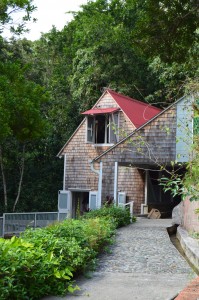 As for lifestyle that surprised me, I expected significantly less fast food places, or I guess I expected more places that would be specific to Puerto Rico and Latin America. But in reality the majority of fast food places I saw, were the exact same as those found in the US. I suppose I had this idea because I forget that Puerto Rico is actually a commonwealth of the US and therefore, I expected it to not have too many similarities. I also found interesting how early shops and stores close in Puerto Rico, I guess I’ve just become accustom to the stores in the states staying open late into the night, that I never considered a grocery store would be closed after dinner. I guess that’s because people have other things to do at night than go grocery shopping. I also thought it was cool that when in El Yunque it wasn’t just for tourist. The visitor center was geared to informing people, and the tours seemed to be more filled with tourists; but the actually hiking to the waterfall seemed like something that families might do as a day trip. I thought that was particularly great to see, because that means that the Puerto Rican people appreciate the rainforest and hopefully will be more apt to help conserve it. But at the same time there was a complete lack of recycling at most food places. So while they might enjoy the rain forest, they’re missing a very easy way to help the environment.
As for lifestyle that surprised me, I expected significantly less fast food places, or I guess I expected more places that would be specific to Puerto Rico and Latin America. But in reality the majority of fast food places I saw, were the exact same as those found in the US. I suppose I had this idea because I forget that Puerto Rico is actually a commonwealth of the US and therefore, I expected it to not have too many similarities. I also found interesting how early shops and stores close in Puerto Rico, I guess I’ve just become accustom to the stores in the states staying open late into the night, that I never considered a grocery store would be closed after dinner. I guess that’s because people have other things to do at night than go grocery shopping. I also thought it was cool that when in El Yunque it wasn’t just for tourist. The visitor center was geared to informing people, and the tours seemed to be more filled with tourists; but the actually hiking to the waterfall seemed like something that families might do as a day trip. I thought that was particularly great to see, because that means that the Puerto Rican people appreciate the rainforest and hopefully will be more apt to help conserve it. But at the same time there was a complete lack of recycling at most food places. So while they might enjoy the rain forest, they’re missing a very easy way to help the environment.
Jenny Marten – Test Post
Hi, my name is Jennifer Marten, I’m currently a freshman studying Agricultural and Biological engineering. I believe my role in this class is to bring an honest and innovative opinion to the table. As the whole class works towards completely one poster for Explore ACES and EOH, teamwork is really important. Therefore being honest with one another is important because that way we can limit conflicts and if someone thinks an idea isn’t going to work, then right away the class as a whole can try and find an innovative solution.


